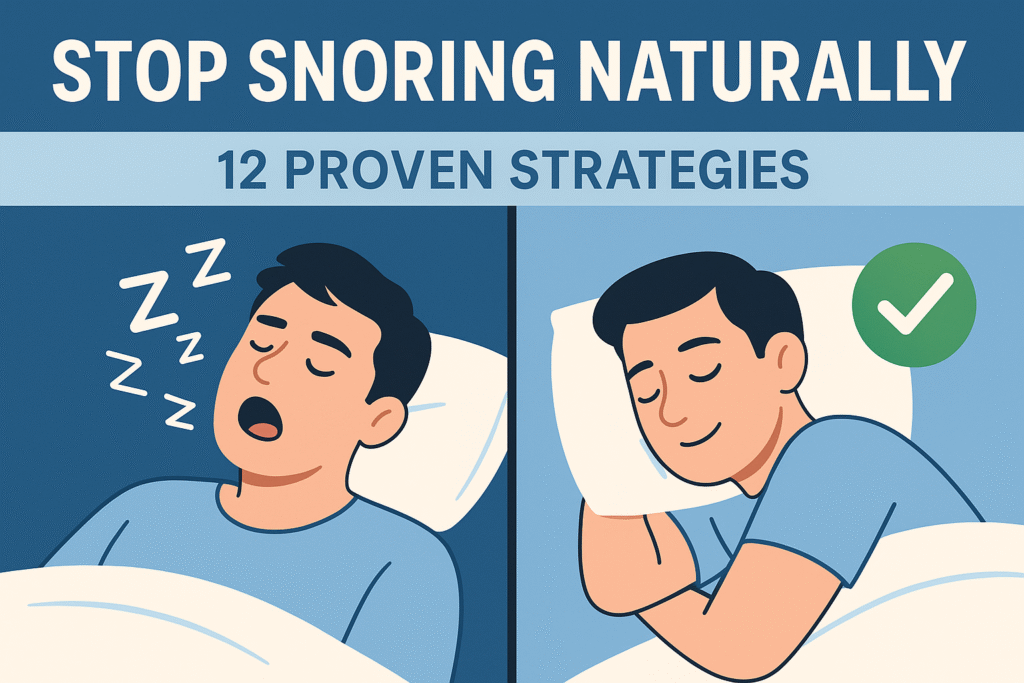
⚠️ Affiliate Disclaimer: This post may contain affiliate links, which means I may earn a small commission — at no extra cost to you — if you make a purchase through one of these links. I only recommend products or services I genuinely trust and believe can provide value. Thank you for supporting My Medical Muse!
How to Stop Snoring Naturally: 12 Proven Strategies That Actually Work
Snoring is common, but it is not something to brush off. It happens when air struggles to pass through relaxed throat tissues during sleep, causing them to vibrate and create noise. Occasional snoring after a long day or nasal congestion is usually harmless, but frequent or loud snoring can signal deeper problems.
Chronic snoring may indicate obstructive sleep apnea, a condition where breathing repeatedly stops during sleep. Even without sleep apnea, ongoing snoring disrupts sleep quality, contributes to daytime fatigue and irritability, and increases the long-term risk of high blood pressure and heart disease. It can also strain relationships with partners and roommates.
The good news is that snoring is often manageable, many cases are caused by lifestyle factors that can be corrected without medication or surgery. By addressing the root causes, it is possible to reduce snoring naturally and improve overall sleep quality.
Table of Content:
- Maintain a Healthy Weight
- Sleep on Your Side Instead of Your Back
- Elevate Your Head While Sleeping
- Keep Your Nasal Passages Clear
- Stay Well Hydrated
- Avoid Alcohol Before Bed
- Quit Smoking
- Exercise Your Throat and Tongue Muscles
- Manage Allergies
- Establish a Regular Sleep Schedule
- Try a Snore-Reducing Device
- Practice Good Sleep Hygiene and Relaxation
- When to See a Doctor
- Conclusion
1. Maintain a Healthy Weight
Excess body weight, especially around the neck and throat, narrows the airway and makes snoring more likely. Extra fatty tissue in this area creates resistance when air moves through the throat, causing vibrations that lead to snoring.
Aim for a healthy body mass index between 18.5 and 24.9. You can calculate your BMI using only your height and weight. Focus on sustainable habits rather than quick fixes. Combine cardiovascular exercise such as walking, cycling, or swimming with strength training to burn fat and build lean muscle. Eat nutrient-dense foods including vegetables, lean proteins, whole grains, and healthy fats. Avoid crash diets, as slow and steady weight loss is more effective and easier to maintain.
Research published in Sleep shows that losing just 10 percent of body weight can reduce snoring frequency by up to 31 percent, particularly in people with obesity. Less tissue around the airway means less resistance during breathing and fewer vibrations. Even if you are not overweight, reducing neck circumference and improving muscle tone can improve airflow and reduce snoring.
2. Sleep on Your Side Instead of Your Back
Sleeping on your back allows gravity to pull the tongue and soft palate toward the back of the throat, partially blocking airflow. This position is a common trigger for snoring. Sleeping on your side helps keep the airway open and reduces obstruction.
Use a body pillow to prevent rolling onto your back, you can also try the tennis ball method by sewing a tennis ball into the back of your pajama top so back sleeping becomes uncomfortable. A wedge pillow can help maintain a slightly angled side position.
Studies show that side sleeping can reduce snoring intensity by up to 50 percent in people with positional snoring. Practicing side sleeping during naps can help train your body to maintain this position at night.
3. Elevate Your Head While Sleeping
Raising your head slightly changes the angle of the airway and helps prevent soft tissues in the throat from collapsing during sleep. This is especially helpful if your snoring worsens when you lie flat.
Use a wedge pillow or an adjustable bed to elevate your upper body by about 4 to 6 inches. Avoid stacking regular pillows, as this can bend your neck unnaturally and worsen breathing. A better option is placing risers under the head of your bed frame.
Elevation uses gravity to keep the airway more open, it can also reduce postnasal drip and acid reflux, both of which contribute to snoring. If nasal congestion is also present, combining elevation with nasal strips may provide added benefit.
4. Keep Your Nasal Passages Clear
Blocked nasal passages force mouth breathing, which increases throat vibration and snoring. Congestion may result from allergies, colds, sinus infections, or dry indoor air.
Use a saline nasal spray before bed to moisturize nasal tissues. Nasal dilator strips can help widen the nostrils and improve airflow. Taking a warm shower before bedtime can loosen mucus, nasal irrigation with a neti pot can also help, but always use sterile, distilled, or previously boiled water.
When nasal passages are open, air flows more smoothly and reduces vibration in the throat. Keeping bedroom air clean and slightly humid can further support easier breathing, especially in dry or polluted environments.
5. Stay Well Hydrated
Dehydration causes mucus in the nose and throat to become thick and sticky, increasing airway resistance. Well-hydrated tissues are more flexible and less likely to vibrate during breathing.
Drink 6 to 8 glasses of water throughout the day, limit caffeine and alcohol, as both can contribute to dehydration. Eat water-rich foods such as fruits and vegetables, if you wake up thirsty at night, keep water by your bedside.
Proper hydration keeps mucus thin and the airway moist, allowing air to pass through with less resistance. This is especially helpful if snoring worsens during allergy season.
6. Avoid Alcohol Before Bed
Alcohol relaxes the muscles of the throat and tongue, making airway collapse more likely during sleep. It also interferes with normal breathing patterns and sleep stages.
Avoid alcohol within 2 to 3 hours of bedtime, if you choose to drink, keep portions small and consume alcohol earlier in the evening. Consider alcohol-free alternatives such as herbal tea or sparkling water at night.
Maintaining muscle tone in the throat reduces airway narrowing and vibration. If your snoring noticeably worsens after drinking, alcohol is likely a major trigger.
Also Read: Negative Effects of Drinking Alcohol on your Health
7. Quit Smoking
Smoking irritates and inflames the lining of the nose, throat, and airways. This irritation causes swelling and increases mucus production, both of which narrow the airway and make snoring more likely. Smoke exposure also dries out airway tissues, making them more prone to vibration during sleep.
If you are trying to quit, nicotine replacement options such as patches, gum, or lozenges can help manage cravings. Support groups and structured quit-smoking programs improve success rates. Replacing the habit with healthier oral alternatives, such as sugar-free gum or crunchy vegetables, can also reduce the urge to smoke.
When inflammation in the airway decreases, breathing becomes smoother and resistance drops. Research shows that smokers are about three times more likely to snore than non-smokers. Many people notice a reduction in snoring within weeks of quitting.
8. Exercise Your Throat and Tongue Muscles
Weak throat and tongue muscles are more likely to collapse during sleep, narrowing the airway. Strengthening these muscles helps keep the airway open and stable throughout the night.
Simple daily exercises can help. Say each vowel out loud and clearly for a few minutes each day. Press the tip of your tongue firmly against the roof of your mouth, hold for five seconds, then relax and repeat several times. Singing or playing wind instruments can also strengthen the muscles that control the upper airway.
A study published in the British Medical Journal found that targeted mouth and throat exercises reduced snoring frequency by about 36 percent. Stronger muscles provide better airway support, reducing vibration during breathing.
9. Manage Allergies
Allergies cause inflammation and congestion in the nose and throat, forcing you to breathe through your mouth at night. Mouth breathing increases throat vibration and makes snoring worse.
Use antihistamines or nasal steroid sprays as recommended by your doctor. Keep windows closed during high pollen seasons, wash bedding weekly in hot water, and use hypoallergenic pillow and mattress covers to reduce allergen exposure.
Controlling allergies keeps nasal passages open and reduces airway swelling, allowing air to flow more smoothly during sleep.
10. Establish a Regular Sleep Schedule
Irregular sleep patterns can leave the body overtired, causing throat muscles to relax too much during sleep. This increases the risk of airway collapse and snoring.
Go to bed and wake up at the same time every day, including weekends. Aim for seven to nine hours of sleep per night, avoid screens for at least an hour before bedtime to help your brain and muscles wind down.
Well-rested muscles maintain better tone and control during sleep, reducing airway obstruction and snoring.
11. Try a Snore-Reducing Device
In some cases, physical aids are helpful in keeping the airway open during sleep. Common options include mandibular advancement devices, which move the lower jaw forward to widen the airway; nasal dilators, which keep the nostrils open; and chin straps, which encourage nasal breathing instead of mouth breathing.
These devices mechanically improve airflow and reduce turbulence, leading to quieter and more stable breathing at night.
12. Practice Good Sleep Hygiene and Relaxation
Stress and poor sleep habits can worsen snoring by increasing muscle tension and encouraging poor sleeping positions.
Create a calming bedtime routine with meditation, deep breathing, or gentle stretching. Keep your bedroom cool, dark, and quiet. Avoid heavy meals within two to three hours of bedtime, as digestion can interfere with breathing and sleep quality.
A relaxed body and supportive sleep environment promote steady breathing and reduce airway collapse.
When to See a Doctor
If you snore loudly, experience pauses in breathing during sleep, wake up with morning headaches, or feel excessively tired during the day, see a doctor. These symptoms may indicate sleep apnea or another underlying sleep disorder that requires medical evaluation.
Conclusion
Snoring is not just a harmless habit, it is often a sign that airflow is being restricted during sleep, and over time, that restriction can affect both sleep quality and overall health. Ignoring it means ignoring a problem that tends to get worse, not better.
The good news is that most snoring is driven by factors you can control. By applying these 12 natural strategies, you can improve breathing, reduce nighttime noise, and restore deeper, more refreshing sleep. Small, consistent changes make the biggest difference, and better sleep benefits not just you, but everyone around you.
👩⚕️ Need Personalized Health Advice?
Get expert guidance tailored to your unique health concerns through MuseCare Consult. Our licensed doctors are here to help you understand your symptoms, medications, and lab results—confidentially and affordably.
👉 Book a MuseCare Consult NowRelated Blog Post:
- Aspirin After Minor Stroke: 7 Powerful Facts You Must Know
- 15 Powerful Natural Remedies to Improve Sleep Apnea Without CPAP
- 10 Steps on How to Track Blood Pressure at Home Accurately
- Why Do I Get Acid Reflux Only at Night? 10 Hidden Reasons + Relief Tips
- Why Do I Feel Tired Even After Sleeping 8 Hours?
- 7 Shocking Reasons Why Sleeping Immediately After Eating Can Harm Your Health
Dr. Ijasusi Bamidele, MBBS (Binzhou Medical University, China), is a medical doctor with 5 years of clinical experience and founder of MyMedicalMuse.com, a subsidiary of Delimann Limited. As a health content writer for audiences in the USA, Canada, and Europe, Dr. Ijasusi helps readers understand complex health conditions, recognize why they have certain symptoms, and apply practical lifestyle modifications to improve well-being


